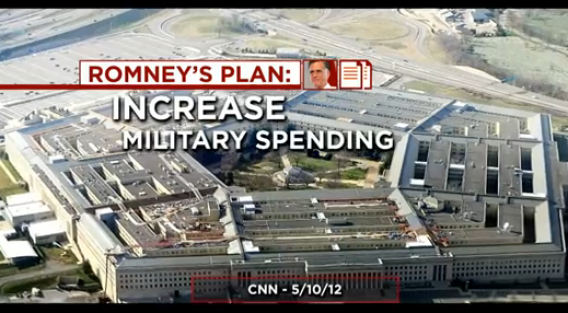President Obama has just released a new TV ad. He’s picking a fight with Mitt Romney over—can you believe this?—the defense budget. The ad says Romney, unlike Obama, would “increase military spending.” Is Obama crazy? Isn’t it political suicide to argue for a cheaper military?
Apparently not.
Democrats have long suffered for looking soft on defense. Remember Mondale and the nuclear freeze? Dukakis in the tank? Clinton and the gay ban? Kerry and the $87 billion? Democrats always preferred less money for national security, but they never admitted it. Just a week ago, in a speech to the Veterans of Foreign Wars, Obama pledged, “We will maintain our military superiority. It will be second to none as long as I am president.”
The new ad abandons this pose. Using Iraq War footage and a fat aerial photo of the Pentagon, it comes out proudly for a leaner defense budget:
Two wars. Tax cuts for millionaires. Debt piled up. And now we face a choice. Mitt Romney’s plan? A new $250,000 tax cut for millionaires. Increase military spending. Adding trillions to the deficit. Or President Obama’s plan: a balanced approach. Four trillion in deficit reduction. Millionaires pay a little more.
I couldn’t believe what I was seeing. So I looked up the latest poll data and compared it to previous years. And you know what? That ad isn’t crazy. The polls have been moving. Obama has caught Romney on what’s now, by some measures, the losing side of the issue.
For six years, the percentage of Gallup respondents who think we spend too much on defense has outpaced the percentage who think we spend too little. Since 2008, the percentage who are very satisfied with the nation’s military strength has increased from 30 to 35, the percentage who are dissatisfied has shrunk from 30 to 23, and the percentage who say our national defense isn’t strong enough has plunged from 47 to 32—a two-decade low.
Every year since 2001, the Pew Research Center has asked Americans whether strengthening the U.S. military should be a top priority, a lower priority, or not a priority. This year, the percentage who called it a top priority fell to an all-time low (39), while the percentage who said it shouldn’t be a priority rose to an all-time high (23). In Harris polls since 2008, the percentage favoring defense cuts has increased from 35 to 42. A table published by Harris this year tracks public opinion on 19 budget areas since 1980. Of these, defense is the only item on which support for cuts has increased.
Other polls taken in the last eight months confirm the pattern. In December, Reuters asked Americans which of six budget items we could “afford to cut back on.” Defense was the most commonly selected option, outpolling education, Medicare, and Social Security. In February, CBS/New York Times interviewers asked a national sample “which of the following programs would you be willing to change in order to cut spending?” Thirteen percent picked Social Security, 15 percent picked Medicare, and 52 percent picked the military. A simultaneous National Journal survey offered respondents five areas—Social Security, Medicare, food stamps, Medicaid, and defense—and asked whether, in each case, “spending should be cut back a lot, some, or not at all to help reduce the deficit.” Defense was the only target on which an affirmative majority agreed, with 60 percent endorsing cuts and only 35 percent opposing them. In April, an academic consortium headed by the Program for Public Consultation asked U.S. adults whether, in view of the federal deficit, Congress should raise some taxes, “reduce national defense spending,” or “reduce non-defense spending.” Respondents were invited to choose any combination of these options. Twenty-seven percent endorsed tax hikes. Fifty percent endorsed cuts in non-defense spending. Sixty-two percent endorsed defense cuts.
Among independents, the issue looks particularly dangerous for Romney. In Gallup’s February sample, twice as many independents said we spend too much on defense (48 percent) as said we spend too little (22 percent). In the CBS/Times sample, when independents were asked “which of the following programs would you be willing to change in order to cut spending,” only 13 percent chose Social Security, and only 14 percent chose Medicare, while 53 percent chose the military. In the PPC sample, when independents were shown the 2012 defense budget and were instructed to propose a new level for 2013, they cut it, on average, by more than a quarter.
Romney and other Republicans, blaming Obama for the prospect of across-the-board defense cuts, seem to think they have a good issue against the president. Maybe they’re right. Or maybe they’re too busy fighting the last war to notice that the battleground has changed.
William Saletan’s latest short takes on the news, via Twitter:
